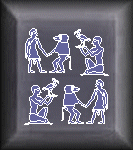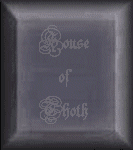
This level of effort is insufficient to our purposes here described, of course. If I am a student of Crowleyism, I am interested in what the magus, himself, meant by what he said, far more than I am in the views of third-hand interpreters. A religious, fraternal or magickal organization of any integrity relies on a body of students who are carefully critical in their investigations of those theories of cause and effect that form the basis of their practices. These traditional habits are a reflection of the deeply cherished common values that the members of such an institution naturally espouse. If the symbols are powerful, their alchemy galvanizes interest and weeds out the immodest of claim. Certainly, anyone truly holding significant office in the cult of Thoth must make many years of scrupulous effort before he or she would be worthy of such mention.
Some of the modern failure to comprehend and thwart envy's threat to competence in an initiatic system might be ameliorated by simply realizing the value of public and private departments in a religious concern. I once stood near the table of an Egyptian merchant's wares at a sci-fi convention. When he occasionally lacked an answer to a customer's question with regard to symbolism, I'd then chime in with some "helpful" hint. After a few of these, he asked how it was that I had come to know such things. His tone wasn't sarcastic, though I may have deserved it. I showed him my Egyptian pocket prayer icon, with my sage in one frame, and my God in the other. He seemed a little supercilious, so I asked him as humbly as I could what issue his instincts might have raised. He said that it wasn't anything negative, just a question as to whether the group responsible for the icon's creation had been a public or a private one. I told him that there was a bit of both in it, and he seemed reasonably satisfied, though perhaps not pleased.
Egyptians are discreet with their observations regarding religion. This custom has little counterpart in America. In building toward a better understanding of what spiritual life can be, we must treat arcane concepts in a conscientious and ethical manner, even going so far as to remain somewhat obscure in our opinions. We should be able to restrain our modern impulses to attribute significance to symbols and archetypes for arbitrary or just consensual reasons. We should be more objective and, yes, conservative. A bandwagon of patrimony for a demagogue is a most unwholesome vehicle for evolution. When people co-opt a sigil of arcane significance as their blazon, this invites a level of responsibility commensurate with the reputation of those on whose work ones own is built. Otherwise, it's a trespass on moral domain, and a disappointment to the deserving. Adherents who care about such things will make clearer the way that, when there is a worthy or necessary modification to be made to bring fresh vitality or essential adaptation to a tradition, it will be one that can serve in a sane, equitable manner.


